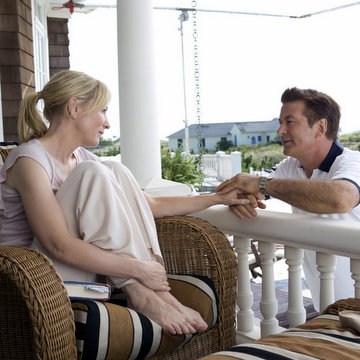'Blue Jasmine': When Philosophy Was in FlowerBy Michael S. Goldberger, iBerkshires Film Critic
02:02PM / Thursday, August 15, 2013 | |

Popcorn Column
|

Sony Pictures Classics
Jasmine (Cate Blanchett) depends on the kindness of strangers — sister Ginger (Sally Hawkins) — in Woody Allen's 'Blue Jasmine.' |
In Woody Allen's "Blue Jasmine," Cate Blanchett is a dazzling amalgam of all those wonderfully complex, troubled women that authors like Tennessee Williams, Ibsen and Chekhov introduced you to in high school English. But while there is a little Nora here and a touch of Hedda Gabler there, for the most part Jasmine is the 21st century rendering of Blanche DuBois, portrayed with the skill and discomfiting vulnerability Streep might have wrought in her younger days, if so inclined.
Without channeling Dr. Freud for an explanation as to why, but instead shamefully interpolating what we've learned about Allen's relationships with the fairer sex through the supermarket rags, one senses a half-apologetic sympathy. The ladies, while preyed upon and the victims of a continually primitive economic system, have dynamism and free will, albeit so difficult to activate. Whereas the men are invariably predators differentiated only by their diverse disguises. Only the cloven hoofs are missing.
Blanchett powerfully seizes this portrayal that most actresses will agree proves the exception to a rule — the one that bemoans a dearth of great feminine roles beyond that scant, ingénue-aged window of opportunity. She delineates her character with X-ray perception.
Joining the aforementioned, inspiring men of belles-lettres in this tragicomic giambotta of whim, wit and sorrow is a touch of Marx (Karl and Groucho) and a dab of Darwin, synergistically stirred together by one of the best cinema sorcerers to ever wave a wand. Although we don't quite learn the meaning of life, gosh knows Woody gives it the old college try.
The plot is parable simple, a mere frame from which to hang the character-driven tale of Jasmine's odyssey from riches to rags and on to her desperate search for some sort of healing reprieve. We learn, as she waxes ad nauseam to a beleaguered fellow traveler on her emigrative flight from New York to San Francisco, that she left college in her third year to marry Hal, a financial wiz who went on to become very, very rich. But now, for reasons I won't share, she needs sanctuary and succor ... at least until she can get her act together.
The destination is her sister Ginger's comedown of an apartment in Frisco where the decidedly blue-collar, divorced sibling resides with her two adolescent sons and, intermittently, with Chili, her grease-monkey boyfriend played with a sarcastically stereotypical air by Bobby Cannavale. Frictions are in store as it becomes obvious oil won't mix with water.
In a bit of hypothetical, running gag sociology that seriocomically threads through the saga, Jasmine and Ginger aren't biologically related, but rather, are adoptees raised by the same parents. The cruel family joke, as Ginger is fond of telling it, is that Mom and Dad preferred Jasmine because she had better genes.
So Jasmine grew up educated and cultured; Ginger ditched the nuclear unit in her late teens and made her own, meat 'n' potatoes way. But now, look who's on top, relatively speaking. As someone in an O'Neill play must have said, or at least should have, "Ah, 'tis a cruel wind that fate blows."
Not that the fat lady has yet sung. That's why we're here ... to find out what caused this fall from grace, and to see if our antiheroine can overcome the setback. We love tales of redemption and comeuppance, mostly because they hardly ever occur in real life. Hence, even in the case of Jasmine, who we suspect is not completely innocent, we root, root root for the underdog, hoping she might rise above the vagaries of life.
To render his slice of contemporary Aesop, Woody Allen again aligns a splendid set of stars and underestimated talents. Representing the former, Alec Baldwin is Hal, Jasmine's sketchy, high-finance husband shaped from the Madoff mold. Exacting a sly dig at the financial corruption of our times, Hal is the arrogant embodiment of smoke and mirrors accounting. Baldwin continues his climb to rightful, thespic prominence.
Personifying the filmmaker's latest thoughts on class struggle and the increasing anti-intellectualism that rises in direct proportion to the Top 1-percenters' continually growing control of power, Sally Hawkins is terrific. Her Ginger, who'd be just as comfortable in Revolutionary Paris as she would on an MTV reality series, breaks life down to its survivalist essence. Much to Jasmine's dismay, she shares no Eliza Doolittle ambitions.
Rounding out the rogues gallery of victims and brutes, Andrew Dice Clay is caustically effective as Ginger's ex, Augie, who's a bit of both. His bleating interjections, combined with the random confessions of other ancillary characters, play an important part in the story's exposition and set the stage for Blanchett's award-worthy, title portrayal. All of which impels Woody Allen's "Blue Jasmine," an alternately light and dark bouquet of thought-provoking notions on the human condition, to blossom with a vengeance.
"Blue Jasmine," rated PG-13, is a Sony Pictures Classics release directed by Woody Allen and stars Cate Blanchett, Alec Baldwin and Sally Hawkins. Running time: 98 minutes
|

 MEMBER SIGN IN
MEMBER SIGN IN
 MEMBER SIGN IN
MEMBER SIGN IN